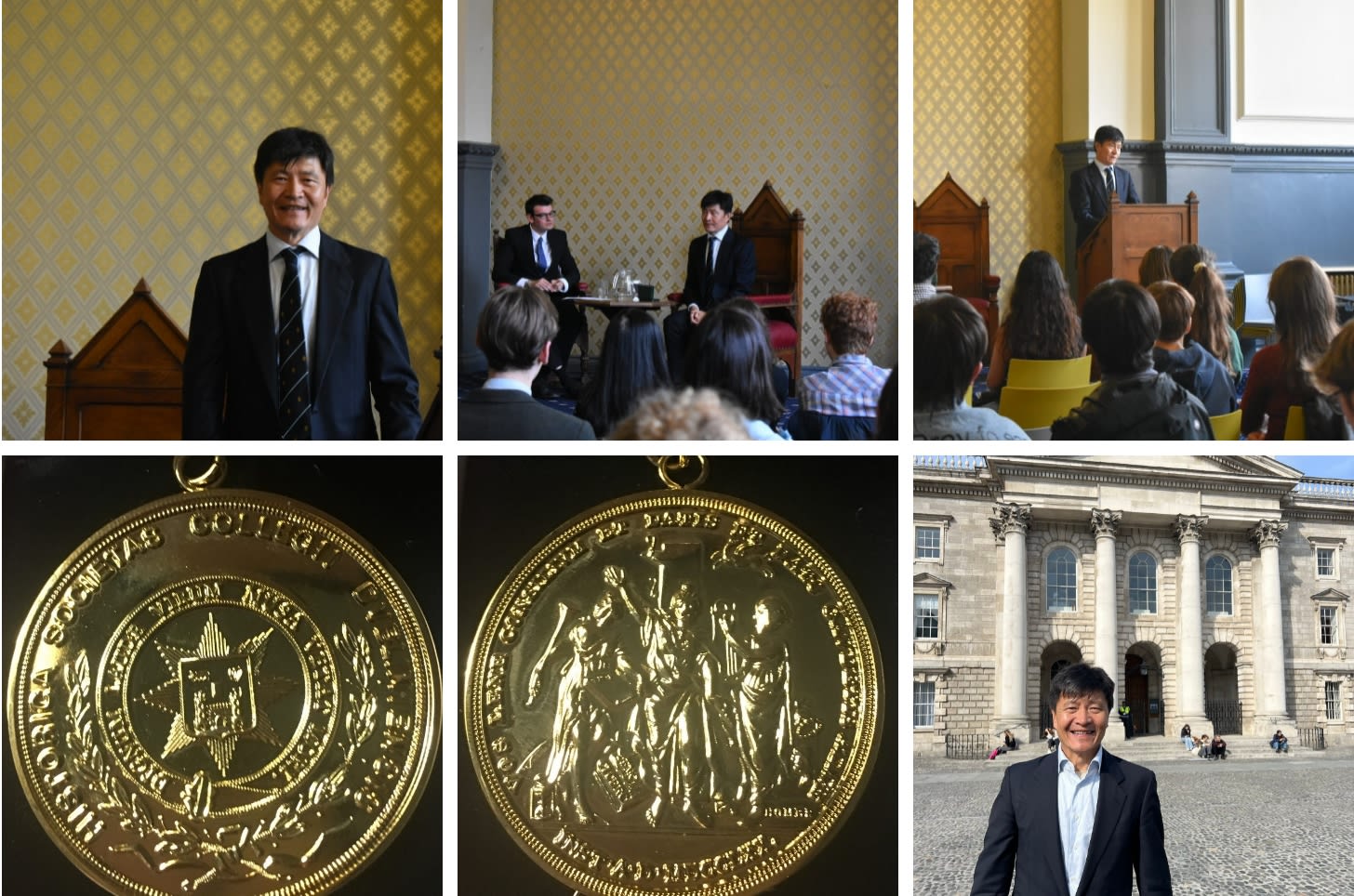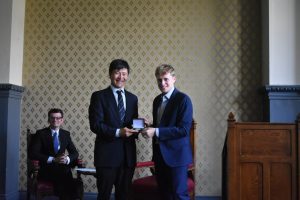人道中国创办人中国人权执行主任因对公共议题的杰出贡献荣获金奖
中文版在后
HRIC Executive Director Receives Gold Medal for Outstanding Contribution to Public Discourse中国人权执行主任因对公共议题的杰出贡献荣获金奖
后附中文版。 On September 9, HRIC Executive Director Fengsuo Zhou received the Gold Medal for Outstanding Contribution to Public Discourse from the College Historical Society of Trinity College Dublin, officially the world’s oldest student society. Past recipients of the medal include Archbishop Desmond Tutu, Patti Smith, Margaret Atwood, and Irish President Michael D. Higgins. Director Zhou was recognized for his unwavering courage and lifelong commitment to advancing democracy and human rights in China and around the world. In his acceptance speech, Director Zhou emphasized that the honor belongs to the many courageous human rights defenders whom he has worked with over the past 35 years, many of whom are still imprisoned by the Chinese government for their defense of human rights and freedoms, such as Wang Bingzhang and Xu Zhiyong. Despite the ongoing pressure from the Chinese authorities, including transnational repression, Director Zhou emphasized: “For me, it is a privilege and honor to work with them, to know that these brave souls are fighting for the dignity and freedom of Chinese people and for the promotion of universal human rights.” The event was attended by about 50 students and faculty who actively participated in the Q&A with Director Zhou and asked many insightful and timely questions. After the event, Zhou said: “I appreciated the opportunity to share my life experiences, from Tiananmen Square to present day. I was especially encouraged by a few Chinese students, who listened attentively.” Read the full speech below.  I am thrilled to be here today to accept this medal. I believe it is an honor not only to myself, but also to the human rights defenders and political prisoners who I have worked with over the last 35 years. It is also an acknowledgement of the importance of Chinese human rights. I thank the Hist for inviting me and allowing me to share my message with all of you. First, I wish to highlight some of the brave defenders and political prisoners who deserve recognition for their work towards human rights in China. Wang Bingzhang, the father of the Chinese democracy movement, has been in prison for more than twenty years, since he was kidnapped from Vietnam by the Chinese authorities. He has been mistreated and put in solitary confinement, and his condition continues to decline in prison. The government refuses to entertain any possibility of releasing him. Jimmy Lai, the owner of Apple Daily, risked everything when he chose to stay in Hong Kong. He chose to sacrifice for the great city that he loved, even though he had the resources to easily leave. He shouldered the responsibility of his media, which was a beacon of press freedom in HK. Xu Zhiyong became well-known 20 years ago for organizing a very influential campaign against the so-called black jails, where police arrested and detained individuals indefinitely without evidence of wrongdoing. Then, he co-founded the New Citizens Movement, which has hundreds of thousands of followers. His vision was one of a beautiful, free China. Although he was a visiting scholar at Yale, he chose to go back because he loves China and wants to dedicate his life to this dream. In 2023, he was sentenced to 14 years in prison for condemning Xi Jinping for his policies, particularly his mis-management of the COVID-19 pandemic. Chow Hang-tung, the young leader of Hong Kong Alliance for Democracy, was only five years old when the Tiananmen massacre happened, but she still devoted herself to holding public commemorations and keeping the protestors’ memory alive. Even facing a lengthy prison term, she spoke out and encouraged the public to speak out. In order to quiet her, the Hong Kong government recently arrested members of her support group on Facebook, including her mother. Zeng Yuxuan, a law student at the Chinese University of Hong Kong, was arrested in 2023 for planning to hold a public memorial for the Tiananmen Massacre. She disappeared after serving four months in prison in Hong Kong, and is presumed to be in the Mainland. Although she was born after the Tiananmen Massacre, she once told me that even though what happened on Tiananmen Square ended as a tragedy, the pursuit of freedom and democracy connects us across generations. Gao Zhisheng was a famous lawyer in Beijing who gave up his prestige and wealth to defend the rights of Falun Gong followers and others facing persecution from the government. For his defense of Falun Gong, he was jailed many times, tortured, and finally disappeared altogether. He has been missing for seven years. Gao’s family suffered with him, and to this day, the government refuses to tell anyone where he is. Pastor Wang Yi was a famous scholar and movie critic before he became a Christian, and eventually the pastor of a leading church in Chengdu. His church was always open to people who were underprivileged and downtrodden, both physically and spiritually. He openly commemorated the Tiananmen Massacre every year, so in order to silence him, the police would detain him every year in June. He bravely criticized Xi Jinping for changing the constitution to make himself the permanent leader of China, and was sentenced to nine years in prison. Finally, the Tiananmen Mothers are a group of family members of the massacred victims. Led by professor Ding Zilin, whose teenage son was killed by the troops on the square, the Tiananmen Mothers have been calling for justice for the past 35 years. The government has all but eradicated the memory of Tiananmen, and they are forbidden to speak in public about the deaths of their loved ones, yet they persist. These people are the ones most deserving of recognition, whose sacrifice and bravery is deserving of an award. For me, it is a privilege and honor to work with them, to know that these brave souls are fighting for the dignity and freedom of Chinese people and for the promotion of universal human rights. Why should western countries care about human rights in China? Look no further than the pandemic. Because there was no freedom of speech, the Chinese government was able to cover it up, even though there were doctors who identified the virus early on One whistleblowing doctor was punished for trying to speak out, and died as a result. Furthermore, through modern technology and global trade, the Chinese government is able to exert influence at a very local level. It is easy for them to infiltrate foreign organizations, and there are reports that they are building a dossier on everyone in the world. Even though people like me were the initial targets, the same tech allows them to target anyone. My own activism journey started on Tiananmen Square. I was first student to offer a flower wreath for Hu Yaobang, the catalyzing event of the protests, and later I built the broadcast station on the square. It was the first time that people in China felt that freedom was nearly within reach. It was the most peaceful protest I have ever participated in. Even though the brutal massacre ended the protest, the Tiananmen protests completely destroyed the legitimacy of the CCP, and contributed to the fall of the Berlin wall and communist governments across the Eastern Bloc. I witnessed the brutal massacre, but I also experienced the most enduring courage and solidarity from the Chinese people. Even years later, after I was released from prison, I often met people who recognized me on the street and warmly encouraged me. Of course, I would never imagine that this was just the starting point of my journey as a human rights activist. 35 years is a long time, and in some ways, the freedom we have been fighting for seems to get further away every year. We are always bombarded by bad news of people being arrested or suffering in and out of prison for their political beliefs. This evil regime, communist China, seems to be getting stronger day by day. Even working outside of China, I have faced constant targeting and repression. When I protested for Chinese human rights in San Francisco at the time of the Beijing Olympics, I was beaten in the street by pro-CCP thugs while the police stood by. I saw the hatred and the violence demonstrated against us by these people who are driven by blind loyalty towards the Party, and I realized that we must fight for every inch of space to maintain our survival. Online, I was censored by LinkedIn and other companies and had my accounts suspended simply for commemorating Tiananmen. I was warned by my company’s HR department when they saw me giving a speech on TV. Many people would avoid me, even in private settings, afraid of any association with me. Why, then, do I keep doing this work? It’s because it is something I love. It’s something I believe in. No matter how hard it is, it’s a joy to be in it day and day out, and to be with these amazing people who keep fighting no matter what. In 2014, I snuck into Beijing to visit Tiananmen for the 25th anniversary, before I was caught, and deported. I gave an interview afterwards, where I said that I would be willing to return to China only if I was able to continue my work and speak about Tiananmen. Shortly after, an article from prominent Chinese commentator Hu Xijin was published, saying that China had changed, and that most students from Tiananmen Square had already joined the CCP, while I remained a rock in the tide of change, sinking to the bottom and refusing to move a single inch. Although it was meant as a criticism, I took it as an apt metaphor for my determination to stay in this fight. Despite the challenges, I have stayed my course for 35 years, no matter what. And I am proud that after all these years, I am still the same person as I was 35 years ago. I still believe in the dream of a beautiful China. 中国人权执行主任因对公共议题的杰出贡献荣获金奖9月9日,人权中国执行主任周锋锁获得都柏林圣三一学院历史学会颁发的杰出贡献公共议题金奖。该学会是世界上历史最悠久的学生社团。过去获得该奖项的人士包括德斯蒙德·图图大主教、帕蒂·史密斯、玛格丽特·阿特伍德和爱尔兰总统迈克尔·D·希金斯。周主任因其坚定不移的勇气以及毕生致力于推进中国和世界各地民主与人权事业而受到表彰。 在他的授勋演讲中,周主任强调,这份荣誉属于过去35年来与他共同工作的众多勇敢的人权捍卫者,其中许多人仍因捍卫人权和自由而被中国政府关押,如王炳章和许志永。尽管面临包括跨国镇压在内的中国当局持续施压,周主任强调:"对我来说,能与他们共事是一种特权和荣幸,知道这些勇敢的灵魂正在为中国人民的尊严和自由以及促进普世人权而奋斗。" 约50名学生和教职员工参加了此次活动,他们积极参与了与周主任的问答环节,提出了许多富有洞察力和时效性的问题。活动结束后,周表示:"我很感激有机会分享我从天安门广场到今天的人生经历。我特别受到鼓舞的是,有几位中国学生专注地聆听了整个过程。" 完整演讲内容请见下文。 我很高兴今天能来到这里接受这枚奖章。我相信,这不仅是对我个人的荣誉,也是对过去35年来与我共事的人权捍卫者和政治犯的表彰。这同时也是对中国人权重要性的肯定。我感谢历史学会邀请我,让我有机会与大家分享我的信息。 首先,我想强调一些勇敢的捍卫者和政治犯,他们为中国的人权事业做出了值得认可的贡献。 王炳章,中国民主运动之父,自从被中国当局从越南绑架以来,已经入狱超过二十年。他遭受虐待和单独囚禁,身体状况在狱中持续恶化。政府拒绝考虑释放他的任何可能性。 黎智英,苹果日报的老板,因选择坚守在香港而置他所拥有的一切于风险之中。尽管他有能力轻易离开,但他选择为他热爱的这座伟大城市牺牲。他扛起了自己媒体的责任,这家媒体曾是香港新闻自由的灯塔。 许志永因20年前组织了一场非常有影响力的反对所谓"黑监狱"的运动而闻名,警察在那里无限期地逮捕和拘留个人,而没有任何犯罪证据。随后,他共同创立了新公民运动,该运动拥有数十万追随者。他的愿景是一个美丽、自由的中国。尽管他曾是耶鲁大学的访问学者,但他选择回国,因为他热爱中国,想要为这个梦想奉献一生。2023年,他因谴责习近平的政策,特别是对新冠疫情的错误管理而被判处14年徒刑。 邹幸彤,香港民主联盟的年轻领袖,天安门大屠杀发生时她才五岁,但她仍然致力于举行公开纪念活动,让抗议者铭记六四。即使面临长期徒刑,她仍然大声疾呼并鼓励公众发声。为了让她安静下来,香港政府最近逮捕了她在脸书上支持团体的成员,包括她的母亲。 曾雨璇,香港中文大学的一名法律系学生,因计划举行天安门大屠杀公开纪念活动而于2023年被捕。她在香港服刑四个月后失踪,据推测现在在大陆。尽管她出生在天安门大屠杀之后,但她曾告诉我,即使天安门广场上发生的事情以悲剧告终,对自由和民主的追求仍然跨越世代将我们联系在一起。 高智晟是北京一位著名律师,他放弃了声望和财富来为法轮功学员和其他面临政府迫害的人辩护。为了捍卫法轮功,他多次入狱,遭受酷刑,最后完全失踪。他已经失踪七年了。高的家人与他一同受苦,直到今天,政府仍拒绝告诉任何人他在哪里。 王怡牧师在成为基督徒之前是一位著名的学者和影评人,最终成为成都一家主要教会的牧师。他的教会一直向身心俱疲的弱势群体开放。他每年公开纪念天安门大屠杀,因此为了使他噤声,警察每年六月都会拘留他。他勇敢地批评习近平修改宪法使自己成为中国的永久领导人,因此被判处九年监禁。 最后,天安门母亲是由遇难者家属组成的团体。在儿子在广场上被军队杀害的丁子霖教授的带领下,天安门母亲们35年来一直在呼吁正义。政府几乎抹去了天安门的记忆,他们被禁止在公开场合谈论亲人的死亡,但他们仍然坚持。 这些人最值得表彰,他们的牺牲和勇气值得获奖。对我来说,能与他们共事是一种特权和荣誉,知道这些勇敢的灵魂正在为中国人民的尊严和自由以及促进普世人权而奋斗。 为什么西方国家应该关心中国的人权问题?看看疫情就知道了。由于没有言论自由,尽管有医生早期就识别出了病毒,中国政府仍能够掩盖真相。一位吹哨人医生因试图发声而受到惩罚,最终不幸去世。此外,通过现代技术和全球贸易,中国政府能够将它的影响力施加在世界各个角落。他们很容易渗透外国组织,据报道他们正在为世界上每个人建立档案。虽然像我这样的人最初是他们的目标,但同样的技术使他们能够针对任何人。 我的倡导之旅始于天安门广场。我是第一个为胡耀邦献花圈的学生,这是引发抗议的催化事件,后来我在广场上建立了广播站。那是中国人第一次感觉自由近在咫尺。这是我参与过的最和平的抗议。尽管残酷的屠杀结束了抗议,但天安门抗议彻底摧毁了中共的合法性,并促成了柏林墙的倒塌和东欧共产政权的垮台。我目睹了残酷的屠杀,但我也经历了中国人民最持久的勇气和团结。即使多年后,当我从监狱释放出来,我经常遇到在街上认出我并热情鼓励我的人。 当然,我从未想到这只是我作为人权活动家旅程的起点。35年是一段很长的时间,在某些方面,我们为之奋斗的自由似乎每年都离我们越来越远。我们总是被那些因政治信仰而被逮捕或在狱中外受苦的人的坏消息轰炸。这个邪恶的政权,共产主义中国,似乎一天比一天强大。即使在中国境外工作,我也面临着持续的针对和压制。当我在北京奥运会期间在旧金山为中国人权抗议时,我在街上被亲共暴徒殴打,而警察却袖手旁观。我看到这些被对党的盲目忠诚驱使的人对我们表现出的仇恨和暴力,我意识到我们必须为每一寸生存空间而战。在网上,我因纪念天安门而被领英和其他公司审查,账号被停用。当公司人力资源部门看到我在电视上发表演讲时,他们警告了我。许多人会避开我,即使在私人场合,也害怕与我有任何关联。 那么,为什么我还要继续这项工作?因为这是我热爱的事业。这是我相信的事业。无论有多困难,日复一日地投身其中,与这些无论如何都会继续战斗的了不起的人在一起,都是一种快乐。 2014年,在被抓获并驱逐出境之前,我偷偷溜进北京,为25周年纪念日访问天安门。之后我接受了采访,我说只有在能够继续我的工作并谈论天安门的情况下,我才愿意回到中国。不久之后,中国著名评论员胡锡进发表了一篇文章,称中国已经改变,大多数天安门广场的学生已经加入了中共,而我仍然像一块岩石一样留在变革的潮流中,沉到底部,拒绝移动一寸。虽然这是批评,但我认为这恰如其分地比喻了我坚持这场斗争的决心。尽管面临挑战,35年来我始终坚持自己的道路,无论发生什么。我为35年后的今天,我仍然是35年前的那个人而感到自豪。我仍然相信美丽中国的梦想。 |




 中国人权执行主任周峰锁因对公共议题的杰出贡献荣获金奖
中国人权执行主任周峰锁因对公共议题的杰出贡献荣获金奖